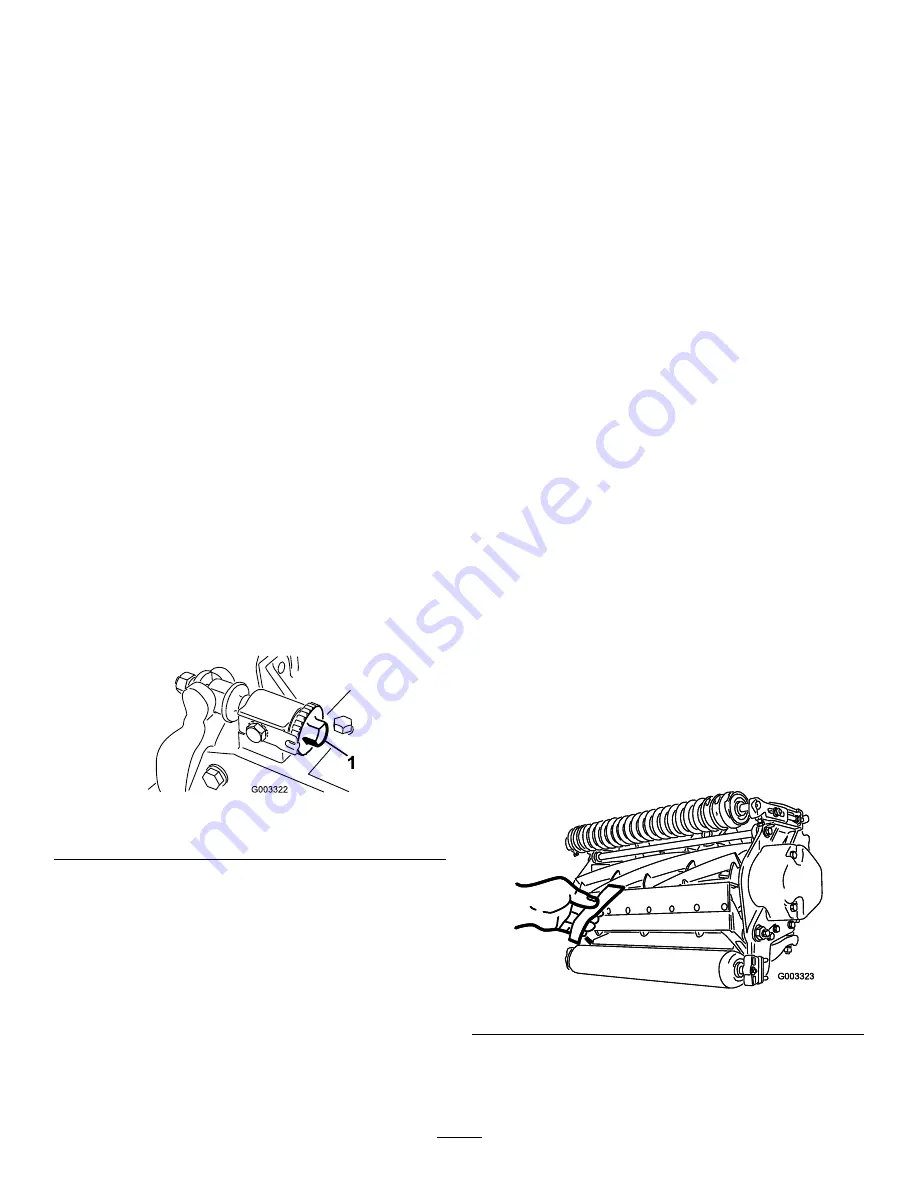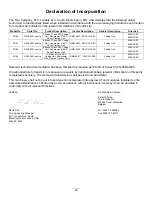
Operation
Note:
Determine the left and right sides of the machine
from the normal operating position.
Adjustments
Adjusting the Bedknife to the Reel
Use this procedure to set the bedknife to the reel and to check
the condition of the reel and bedknife and their interaction.
After completing this procedure, always test the cutting
unit performance under your field conditions. You may
need to make further adjustments to obtain optimal cutting
performance.
Important:
Do not overtighten the bedknife to the reel
or you will damage it.
•
After backlapping the cutting unit or grinding the reel, you
may need to mow with the cutting unit for a few minutes
and then perform this procedure to adjust the bedknife to
the reel as the reel and bedknife adjust to each other.
•
You may need additional adjustments if the turf is
extremely dense or your cutting height is very low.
You will need the following tools to complete this procedure:
•
Shim (0.002 inch) — Toro part number 125-5611
•
Cutting performance paper—Toro part number 125-5610
1.
Position the cutting unit on a flat, level work surface.
Turn the bedbar adjusting screws counterclockwise
to ensure that the bedbar does not contact the reel
(Figure 12).
Figure 12
1.
Bedbar adjusting screw
2.
Tip the mower, to expose the bedknife and reel.
Important:
Make sure nuts on back end of bedbar
adjusting screws are not resting on the work
surface (Figure 12).
3.
Rotate the reel so that a blade crosses the bedknife
approximately 25 mm (1 inch) in from the end of the
bedknife on the right hand side of the cutting unit.
Putting an identifying mark on this blade will make
subsequent adjustments easier. Insert the 0.05 mm
(0.002 inch) shim between the marked reel blade and
the bedknife at the point where the blade crosses the
bedknife.
4.
Turn the right bedbar adjuster clockwise until you feel
light
pressure (i.e. drag) on the shim, then back off the
bedbar adjuster two clicks and remove the shim. (Since
adjusting one side of the cutting unit affects the other
side, the two clicks will provide clearance for when the
other side is adjusted)
Note:
If starting with a large gap, both sides should
initially be drawn closer by alternately tightening the
right and left hand sides.
5.
Slowly
rotate the reel so that the same blade that you
checked on the right side is crossing the bedknife
approximately 25 mm (1 inch) in from the end of the
bedknife on the left hand side of the cutting unit.
6.
Turn the left bedbar adjuster clockwise until the shim
can be slid through the reel to bedknife gap with light
drag.
7.
Return to the right side and adjust as necessary to get
light drag on the shim between the same blade and
bedknife.
8.
Repeat steps 6 and 7 until the shim can be slid through
both gaps with slight drag, but one click in on both
sides prevents the shim from passing through on both
sides. The bedknife is now parallel to the reel.
Note:
This procedure should not be needed on daily
adjustments, but should be done after grinding or
disassembly.
9.
From this position (i.e. one click in and shim not
passing through) turn the bedbar adjusters clockwise
one click each.
Note:
Each click turned moves the bedknife 0.022
mm (0.0009 inches).
Do not over tighten the
adjusting screws.
10.
Test the cutting performance by inserting a long strip
of cutting performance paper (Toro part number
125-5610) between reel and bedknife, perpendicular
to the bedknife (Figure 13). Slowly rotate the reel
forward; it should cut the paper.
G003323
G003323
Figure 13
Note:
Should excessive reel drag be evident, it will be
either necessary to backlap or regrind the cutting unit
to achieve the sharp edges needed for precision cutting.
9










































